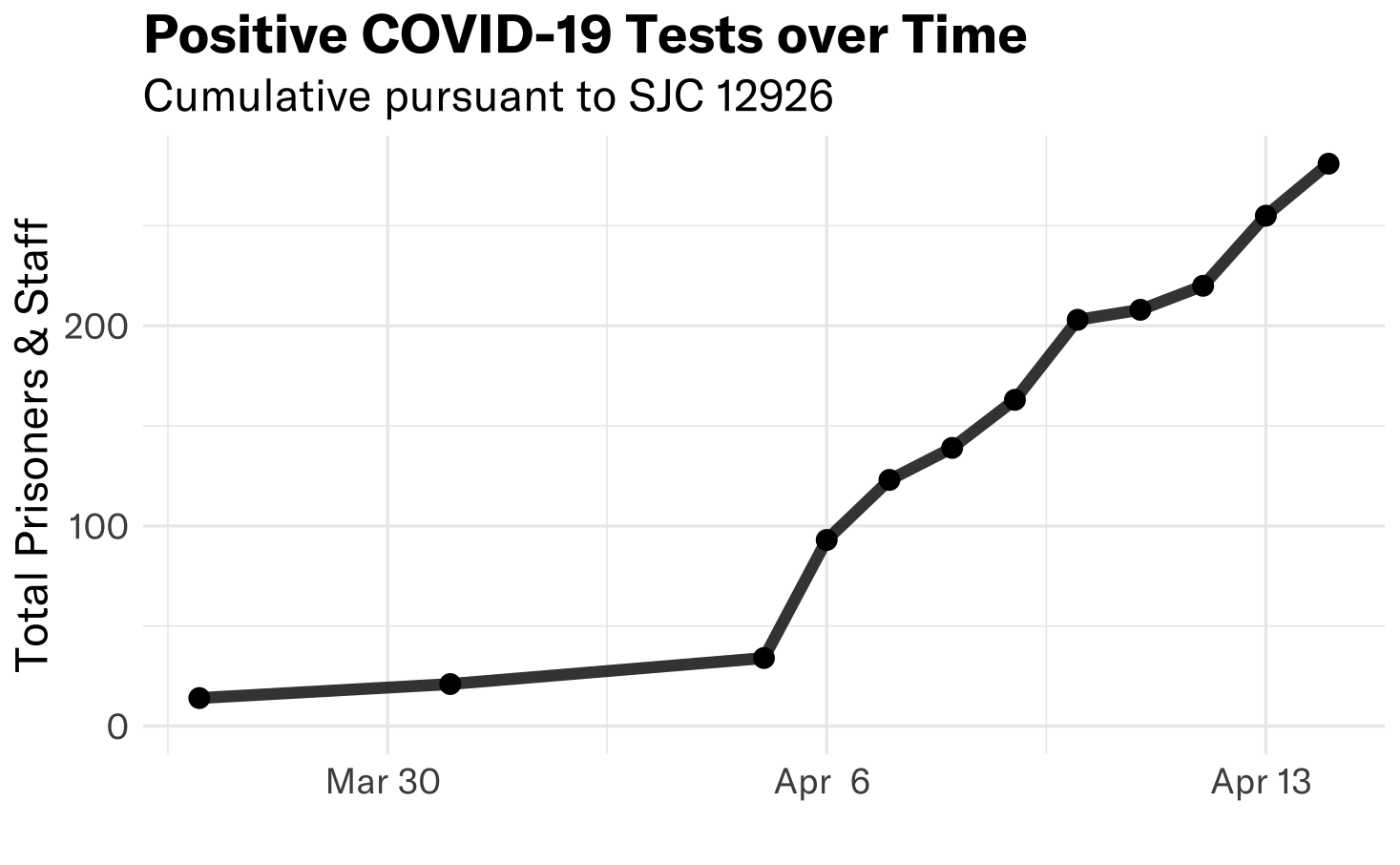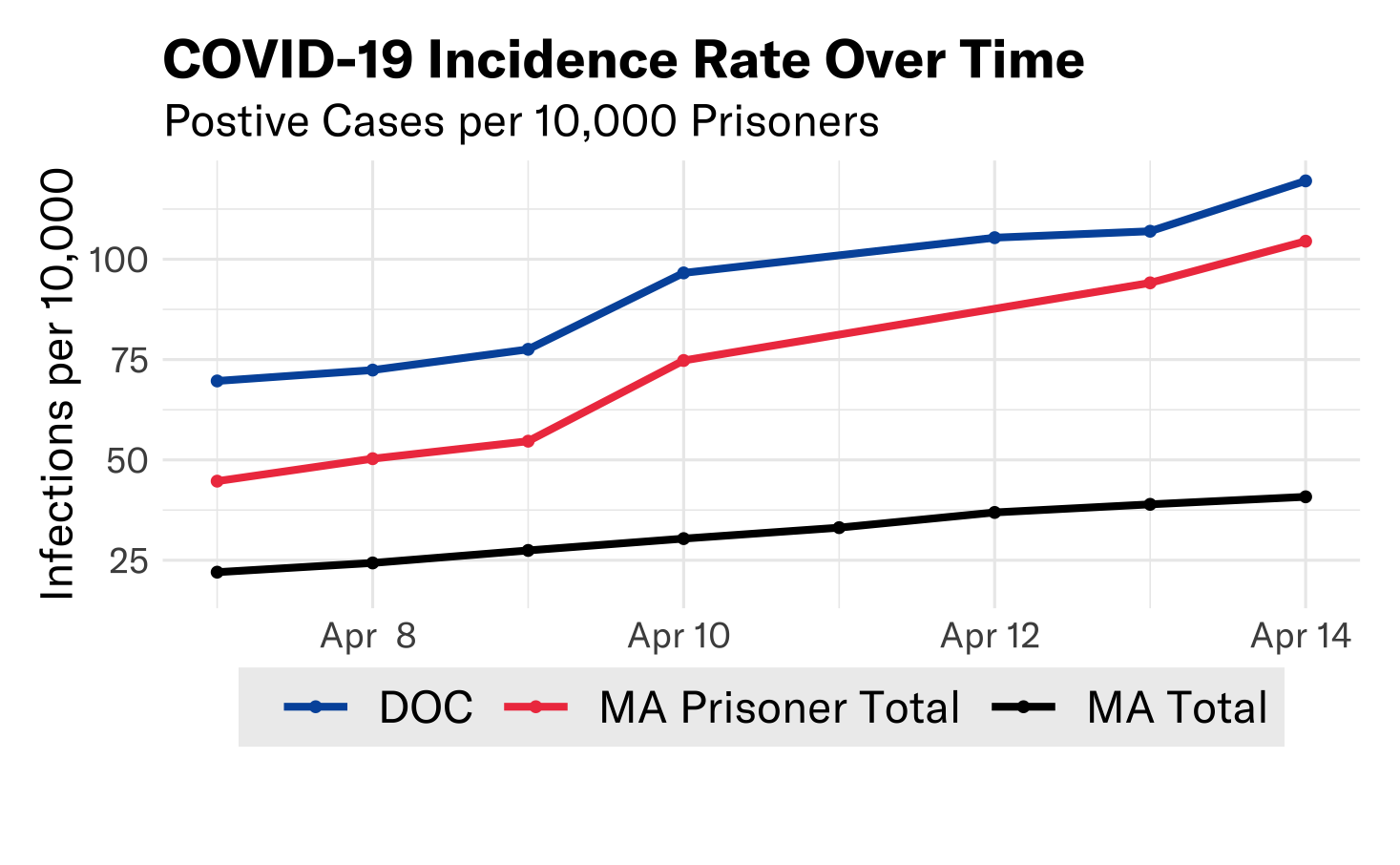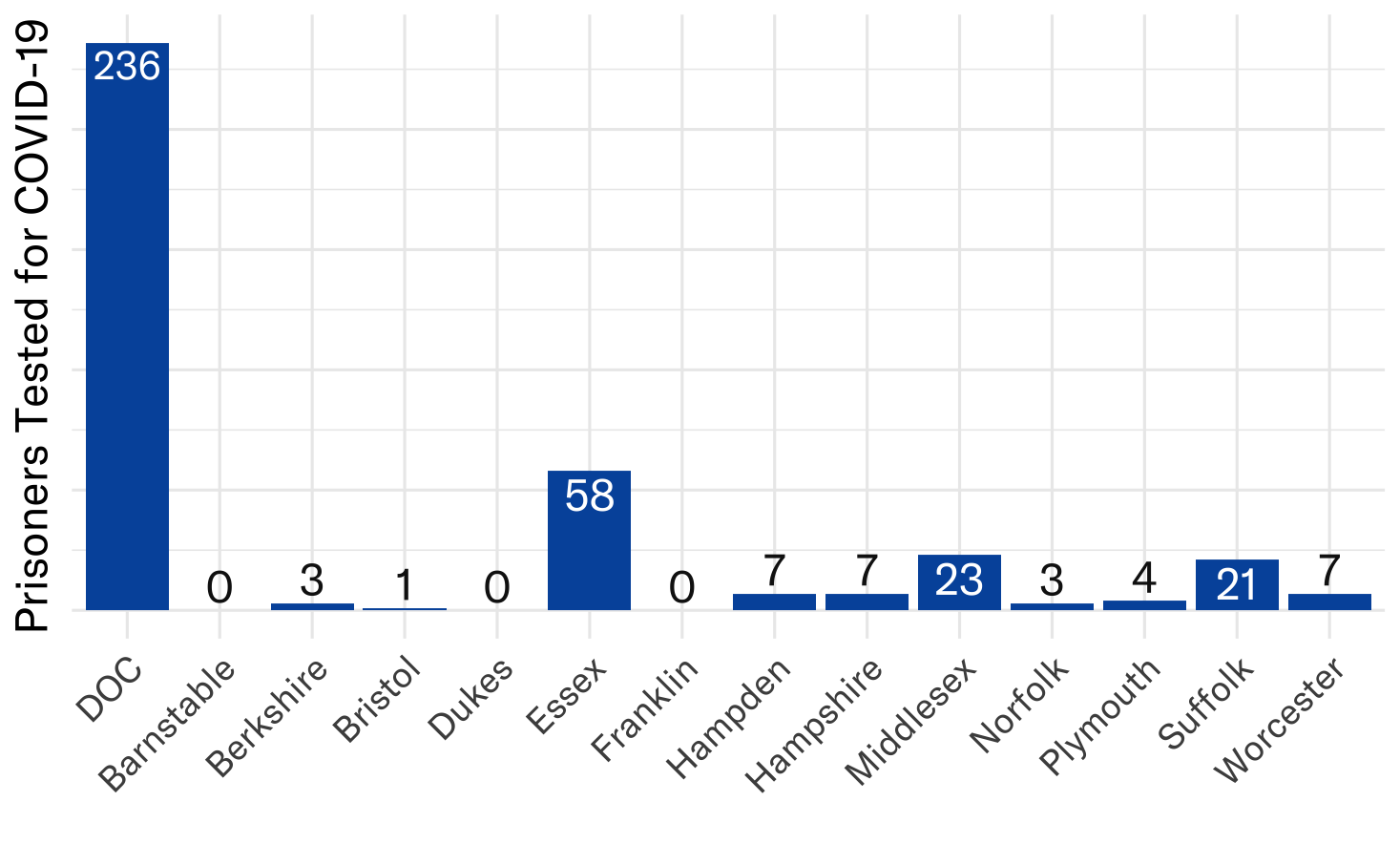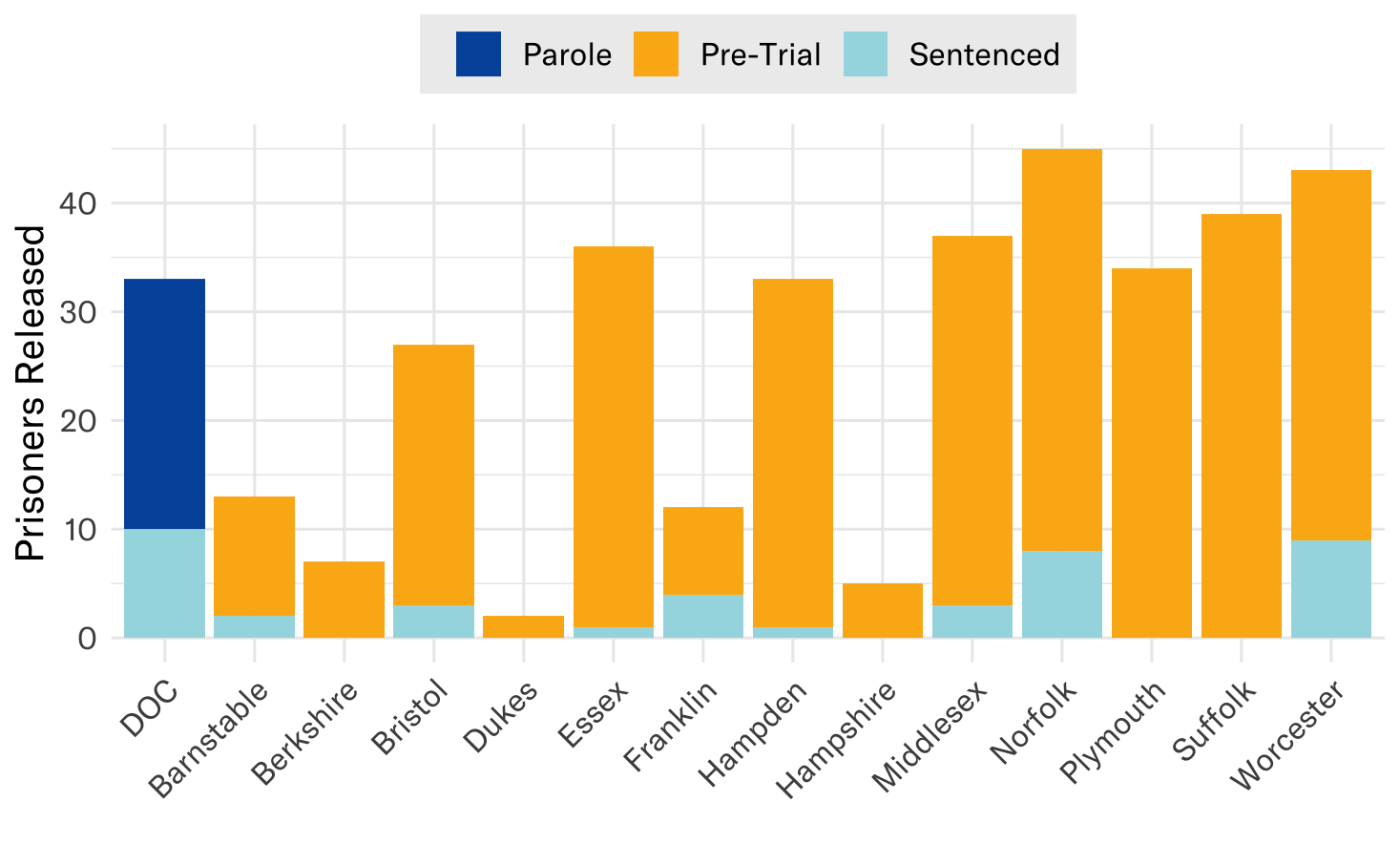While the COVID-19 pandemic poses a massive threat to the general population, imprisoned populations face even higher risks due to close living quarters, poor hygiene, and inadequate medical attention.
On April 3, 2020, the Supreme Judicial Court of Massachusetts (SJC) in Committee for Public Counsel Services (CPCS) v. Chief Justice of the Trial Court, SJC-12926 issued an order that will help some incarcerated people in Massachusetts seeking release in response to the threat of COVID-19. Per its decision, the Court now allows some people detained pre-trial to request a hearing for their release where they will be entitled to a rebuttable presumption of release. The Court also ordered daily reports from prisons, jails, and houses of corrections across the state.
Each day, these reports document how many COVID-19 tests are performed on prisoners and staff, how many tests return positive, and how many people are released from confinement pursuant to the Court’s decision. Analysts and developers at the ACLU of Massachusetts have developed a new interactive tracking portal to make these data available to the public and perform preliminary analysis of trends.*
Here we present four major takeaways from the first week of reports, illustrating that Massachusetts prisoners already face an exceptional threat due to COVID-19.
1. COVID-19 cases are skyrocketing in prisons and jails
Statewide, the number of positive COVID-19 cases inside prisons and jails is increasing at a terrifying rate. In just one week, the total number of reported positive cases increased over 200 percent, from 93 prisoners and prison staff who had tested positive by April 6 to 281 positive tests by April 14.

State Department of Correction (DOC) facilities alone account for 62 percent of all cases, reporting 158 positive cases by April 14.
Certain individual facilities have become frightening hotspots, too, with positive cases in Essex County increasing 375 percent from 9 cases on April 6 to 43 cases on April 14. And at the Massachusetts Correctional Institution in Framingham, over 10 percent of prisoners have tested positive for COVID-19.
2. Rates of COVID-19 inside prisons and jails are much worse than statewide
As of April 14, the COVID-19 incidence rate among all prisoners incarcerated in Massachusetts is 104 reported positive cases per 10,000 prisoners. In DOC facilities, the situation is even more dire, with a case incidence rate of 120 reported positive cases per 10,000 prisoners.
For comparison, on April 14 Massachusetts reported a statewide case incidence rate of 41 reported positive cases per 10,000 residents. This means the incidence rate of COVID-19 among prisoners within correctional facilities is over two times higher than the statewide rate.
 Yet looking to criminal justice facilities nationwide, it is clear that things can get much, much worse. According to the Legal Aid Society, the COVID-19 incidence rate at Riker’s Island Prison in New York City was 814 reported positive cases per 10,000 people on April 14.
Yet looking to criminal justice facilities nationwide, it is clear that things can get much, much worse. According to the Legal Aid Society, the COVID-19 incidence rate at Riker’s Island Prison in New York City was 814 reported positive cases per 10,000 people on April 14.
The meteoric increase of cases in Massachusetts facilities suggest we might reach similarly astronomical numbers soon – unless courts and criminal legal system officials take immediate action.
3. Testing in some MA prisons and jails is abysmal
Access to COVID-19 tests in the United States is insufficient nationwide, and the situation is even worse within Massachusetts county jails.
Multiple county sheriffs have not reported testing a single prisoner for COVID-19 since at least April 5. Such counties include Barnstable and Franklin Counties, whose correctional facilities together incarcerate over 300 people.
Other counties have reported testing at unacceptably low rates: Bristol County has administered a COVID-19 test to just 1 of its over 600 prisoners (0.2%); Norfolk County has tested just 3 of 368 (0.8%); Plymouth County, 4 of 744 (0.5%).

Compare this to testing rates across Massachusetts, where 126,551 tests have been administered as of April 14, for a statewide testing rate of 1.8 percent.
Tests of jail employees, including correctional officers, contractors, and other staff, are lacking as well. Bristol County and Suffolk County have not reported administering a single COVID-19 test to any of its staff, again since at least April 5.
Altogether, the positive rate of tests performed on all prisoners and staff is 49 percent (281 positives from 578 tests). This massively inflated rate reflects not only that COVID-19 is running rampant within prisons and jails, but also that nowhere near enough tests are being performed to inform proactive decisions; these facilities are playing whack-a-mole with prisoners’ and correctional officers’ lives.
4. SJC decision leads to some prisoners released – but not nearly enough
Some good news is that the Supreme Judicial Court decision has indeed led to the release of some people from incarceration. As reported to the Court, 366 prisoners have been released pursuant to the ruling in SJC 12926. Of these, over 80 percent are releases of pre-trial detainees who have not been convicted.

This result is significant for these 366 people and their loved ones. But releasing such a small number of people will not stop the crisis from overtaking our prisons and jails—putting incarcerated people, prison and jail staff, and the entire community at greater risk of infection and death.
This is why, in an open letter to public officials on March 18, the ACLU of Massachusetts urged Governor Baker to grant emergency commutations for “people whose sentence would end in the next year, to anyone currently being held on a technical supervision violation, and to anyone identified by the CDC as particularly vulnerable whose sentence would end in the next two years.” Neither the Supreme Judicial Court nor the governor have acted yet in favor of release for such sentenced prisoners, and only 41 sentenced prisoners have been released.
Governor Baker can and must protect these vulnerable individuals, or they will remain trapped inside increasingly dangerous facilities with no available options for recourse, and many will die.
The best available data on COVID-19 in Massachusetts prisons and jails suggest that many facilities are death traps where inmates and staff alike suffer from skyrocketing rates of infection and insufficient testing.
In a new letter submitted on April 14, the ACLU of Massachusetts and the Massachusetts Public Health Association once again urged the Governor to take action to release incarcerated individuals in the face of pandemic, by (1) ordering the Parole Board to expedite previously-made parole decisions for hundreds of people who have been granted parole but have not yet been released; (2) amending the Executive Clemency Guidelines in light of the pandemic and (3) directing the Advisory Board of Pardons to expedite the processing of pending clemency petitions.
As the Petitioners in CPCS v. Chief Justice of the Trial Court explained in their emergency petition to the Court on March 24, “There are about 16,500 human beings in our prisons and jails. None of them have been sentenced to death. Yet, without aggressive and immediate intervention, COVID-19 will likely kill many of them.”
Four prisoners have died of COVID-19 in Massachusetts since that emergency petition was filed. We don’t need to wait for that number to climb higher before declaring a crisis within our prisons and jails. Unfortunately, the data show that crisis is already here. The time to act is now.
*The Special Master in CPCS v. Chief Justice of the Trial Court released a report on April 14th publishing data that conflict with data reported here and in our web tracker. The ACLU of Massachusetts is aware of the disparities, understands their causes, and is in the process of communicating with the Special Master to resolve the issue.
